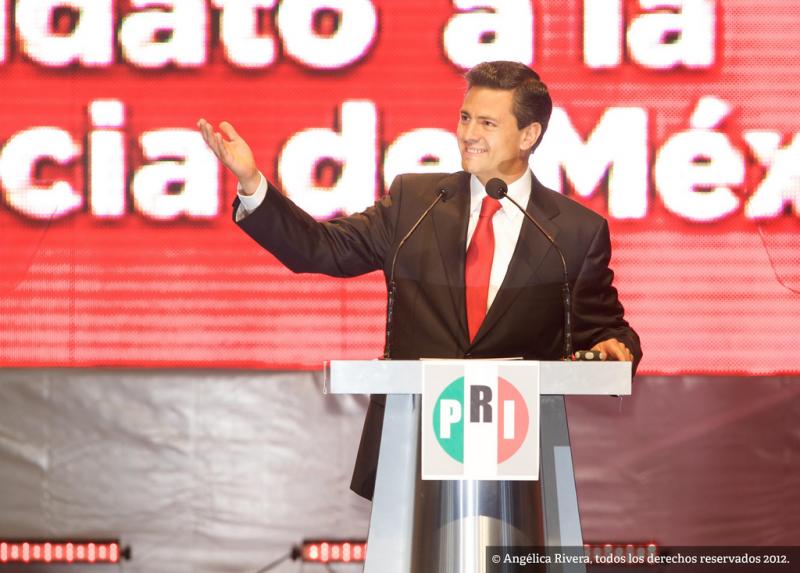The Future Of Mexico: Enrique Peña Nieto

Peña Nieto, 46, is setting out to rebrand the world's 11th most populous country as one less marred by violence and more focused upon international trade than the Mexico of the past. However, a negative public image and the historically corrupt nature of his party have already created problems for the president-elect.
He will be sworn into office in the capital's congressional building, which is currently surrounded by a 9-foot-tall metal barricade. Tuesday, protestors of the new regime tore down parts of the structure, which many see as just the first of many social partitions that will arise between Peña Nieto and the Mexican population throughout the term.
According to CNN, Mexico City Mayor Marcelo Ebrad, a member of the opposing Party of the Democratic Revolution, called the barricade both "a very bad sign of what the new government is going to be" and an insult to the city and the integrity of its inhabitants.
"I've never seen a [military] deployment of this size," he said. "What are they afraid of?"
Peña Nieto, who hasn't been able to disassociate himself from the PRI's history of widespread corruption, faces an uphill battle against public perception.
"I believe Peña Nieto is . . . most likely to serve as a puppet to the interests of Carlos Salinas de Gortari, Carlos Slim and many other millionaires that have [stolen] Mexico's patrimonies and created many monopolies, closing the market to the creation of new jobs and enterprises," said Universidad de las Américas Puebla student Ana Salas. His goal, she said, is "keeping the poor . . . even poorer and ignorant so they are easier to control and [making] the rich even richer."
Over the course of seven decades, Mexicans grew accustomed to such corrupt, behind-the-scenes politics from the PRI, once known as the world's most "perfect dictatorship." In the final years of the 20th century, a series of political scandals, including the 1994 assassination of PRI presidential candidate Luis Donaldo Colosio, cost the party its firm grip upon Mexico.
Now, after two presidents from the National Action Party (PAN) guided the country for 12 years, the PRI is trying to rebrand itself using the fresh, telegenic face of Peña Nieto. The former governor of the central State of Mexico, Peña campaigned with promises of making the Mexican economy an international power and reducing the country's drug-related violence.
Since outgoing-president Felipe Calderón began to deploy federal troops to fight drug cartels in 2006, the number of deaths associated with organized crime in Mexico has been estimated at 60,000. However, according to a Nov. 27 report from the Tijuana-based magazine "Zeta," that number is actually closer to 83,000.
Peña Nieto has stated that his primary method of defense against the bloodshed will be economic reform.
"That, I think, is going to be the best way my government can prevent organized crime," he told CNN, explaining that "millions of [his] countrymen have no other option than to dedicate themselves sometimes to criminal activity" due to poor financial situations.
Unlike many of his fellow Latin American leaders, Peña Nieto does not view drug legalization as a viable option. In an interview with PBS in July, the president-elect stated he did not "believe that [legalization] is the path to reduce violence and illegal trafficking of these products," and he reiterated those sentiments in a meeting with President Obama on Tuesday.
In Washington, the leaders spoke of the future of bilateral relations between the United States and Mexico, specifically concerning immigration and drug reform.
"We want our border to be a safe, modern, connected border, a legal border," said Peña Nieto, according to the Chicago Tribune. "That's exactly what we've set out to accomplish."
Prior to addressing international concerns, however, the president-elect must focus upon earning the trust and respect of the Mexican public.
According to the Guardian, Peña Nieto will not deliver a speech after he is inaugurated Saturday. Also declining to address Parliament or hold a party in the chamber of deputies, as per tradition, he will instead celebrate in the National Palace "in the company of dignitaries, heads of government, diplomats, members of several royal families, religious leaders and celebrities from the worlds of culture, sciences and sports."
Reach reporter Greg Asciutto here, or follow him on Twitter.



